Methuselah lived longer than Adam. These two men, Adam and Methuselah, pretty well bridged the gap between creation and the Flood.
According to our genealogy, this man Methuselah could have told Noah everything from the creation of the world. I personally feel that we have a gap in the genealogy given here.
We know that in the opening of the New Testament the genealogy that is given of the Lord Jesus leaves out quite a few, and purposely so, because there is an attempt to give it in three equal segments.
Certain ones are left out, but you will notice that it follows through accurately.
I am sure that this genealogy is accurate, but the important thing is that we may have a gap here that would account for the fact that man has been on this earth a great deal longer than we have supposed.
Scripture is not clear right here.
Why isn’t it?
Because God is not anxious to insist upon that. What He is trying to get over to us is the religious, the redemptive, history of mankind on this earth.
Genesis 5:27-32 KJV
[27] And all the days of Methuselah were nine hundred sixty and nine years: and he died.
[28] And Lamech lived an hundred eighty and two years, and begat a son:
[29] And he called his name Noah, saying, This same shall comfort us concerning our work and toil of our hands, because of the ground which the LORD hath cursed.
[30] And Lamech lived after he begat Noah five hundred ninety and five years, and begat sons and daughters:
[31] And all the days of Lamech were seven hundred seventy and seven years: and he died.
[32] And Noah was five hundred years old: and Noah begat Shem, Ham, and Japheth.
GENEALOGY OF THE PATRIARCHS
These Columns Show Which of the Patriarchs Were Contemporary With Each Other
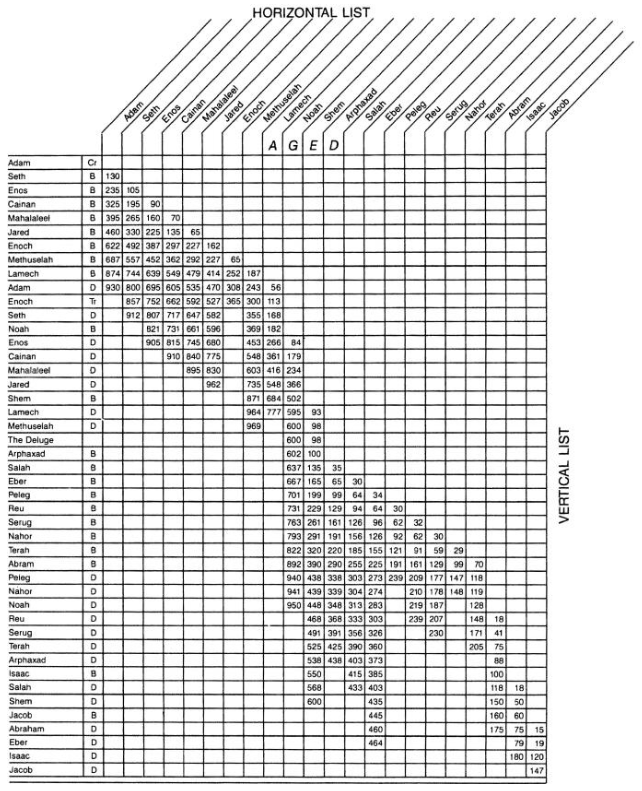
Key:
- Cr—Creation
- B—Born
- D—Died
- Tr—Translated
EXAMPLE: Noah (vertical list) was born when Methuselah (horizontal list) was 369 years old.
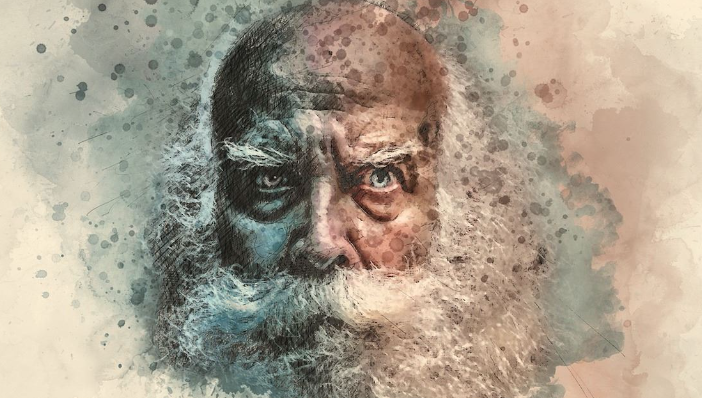
Genesis 5:27
And all the days of Methuselah were nine hundred sixty and nine years: and he died.
Methuselah lived longer than anyone has ever lived, 969 years; he apparently died just before Noah’s flood; despite his Godly father, there is no record that he lived for God. Methuselah lived longer than Adam.
These two men, Adam and Methuselah, pretty well bridged the gap between creation and the Flood. According to our genealogy, this man Methuselah could have told Noah everything from the creation of the world.
I personally feel that we have a gap in the genealogy given here. We know that in the opening of the New Testament the genealogy that is given of the Lord Jesus leaves out quite a few, and purposely so, because there is an attempt to give it in three equal segments.
Certain ones are left out, but you will notice that it follows through accurately. I am sure that this genealogy is accurate, but the important thing is that we may have a gap here that would account for the fact that man has been on this earth a great deal longer than we have supposed.
This is something I do not care to go into because it is quite an involved subject. Scripture is not clear right here.
Why isn’t it?
Because God is not anxious to insist upon that. What He is trying to get over to us is the religious, the redemptive, history of mankind on this earth. The name of Methuselah means “sending forth.” Others believe that Methuselah meant: “When he is dead, it shall be sent.”
What will be sent?
The Flood. As long as Methuselah lived, the Flood could not come. The very interesting thing is that according to a chronology of the genealogy of the patriarchs, the year that Methuselah died is the year that the Flood came.
“When he is dead, it shall be sent”—that is the meaning of his name.
Why did Methuselah live longer than any other person?
God kept him here just to let mankind know that He is patient and merciful. God will also wait for you, my friend—all of your life.
Peter speaks of the long-suffering of our God: “Which sometime were disobedient, when once the long-suffering of God waited in the days of Noah, while the ark was a preparing, wherein few, that is, eight souls were saved by water” (1 Pet. 3:20).
As we continue down through the rest of this chapter, each man is mentioned and then his death.
Methuselah’s status as the oldest person recorded in the Bible is the reason his name is often a punchline. Modern people sometimes jokingly refer to a very old person as “Methuselah.”
At 969 years, Methuselah not only lived more than 200 years in parallel with Adam, he saw the world as it was just prior to the great flood.
The long lifespans of this chapter can be attributed to many possible effects. The earth of this era would have been free from most diseases and pollution. Nearly perfectly-clean air, food, and water would have been the norm.
And, humanity had not yet suffered the effects of long-term genetic decay. So, given that both human biology and human environments were “brand new,” it’s not shocking to imagine people surviving to extraordinary old age.
Even today, modern biology suggests that length of life is far more influenced by biology and environment than anything else: living things die because of corruption.
In some respects, Methuselah’s story is just like the others recorded in this genealogy. His story ends with the common phrase, “and he died.” He is said to have fathered many sons and daughters. However, there are some aspects of his life which are remarkable.
Among these, of course, are his long life, and the unusual fate of his father, Enoch (Genesis 5:24). Methuselah also outlives his son, Lamech, who will die five years before him.
Methuselah’s name has a dual interpretation. It can be taken to mean “man of the dart,” or “his death brings judgment.” As it turns out, according to the ages given in this chapter, Methuselah will die in the same year as the flood.
This, combined with the fact that Methuselah was born prior to the death of Adam, is especially important. Right up the point of destruction, mankind still had access to (at worst) second-hand accounts of the origins of our entire race.
Genesis chapter 6 describes humanity at the end of Methuselah’s life as deeply depraved (Genesis 6:5). And yet, the history of mankind was not lost or obscure.
There were men and women walking the earth who had seen, personally, what had happened in the past, and who God was. This makes the depth of sin during Noah’s era all the more tragic.
What’s also intriguing about Methuselah are questions about his life, and his character. Clearly, most of his children were not followers of God—only his grandson Noah would be rescued by God.
Strictly speaking, we don’t know anything about Methuselah or his relationship with God. He might have been devout like his father, or he might not. The fact that he dies in the same year as the flood could even mean he was killed by it. We simply do not know.
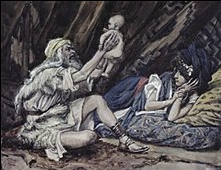
Genesis 5:28
And Lamech lived an hundred eighty and two years, and begat a son:
Lamech fathered a son.
Lamech is the ninth generation from Adam, despite being born many hundreds and hundreds of years after Adam. Using the ages given in this chapter, Adam was still alive when Lamech was nearly sixty years old!
That’s an important part of the context of this passage. The next chapter will describe mankind as deeply depraved, causing God to send the flood (Genesis 6:5). Clearly, humanity could not blame their sins on forgetfulness, or having lost their heritage.
At the time of the flood, there would have been men and women alive who personally knew Adam, or his sons and daughters. The evil of mankind was not because we had forgotten about God, but because we had chosen to reject Him.
This verse also breaks the normal pattern of the chapter, adding Lamech’s prophetic comments about his son, Noah, in the next verse.
Lamech is the first of the patriarchs to actually “die” before his father. While his grandfather, Enoch, was only on earth for 365 years, he was taken by God prior to death. Lamech will die at the age of 777, five years before his father, Methuselah.
Genesis 5:29
And he called his name Noah, saying, This same shall comfort us concerning our work and toil of our hands, because of the ground which the LORD hath cursed.
We are now introduced to Noah, one of the central figures of the Bible, and of all time. His name means “rest”. It seems that Lamech, the father of Noah, had been given a Revelation concerning this child.
The comfort he brought, as it regards the curse, had to do with the Ark, and the One Who would ultimately come through his lineage, the Son of God, Who would remove the greater curse — the curse of the broken Law [Gal. 3:13].
This verse introduces the second major patriarch in the book of Genesis: Noah. Lamech’s comments in this verse show a strong contrast between the lineage of Seth, and that of Cain.
One of Cain’s descendants was also named “Lamech,” but he is recorded as bragging about his sin (Genesis 4:23–24). The Lamech described here, a descendant of Seth, is mourning the struggles humanity has faced since the fall.
This results in him giving his son the name Noah, which sounds very much like the Hebrew word for “rest or comfort.”
In addition, Lamech speaks a prophecy about his son: Out of the cursed ground, Noah would bring relief from the painful work and toil of his people’s hands.
Perhaps Lamech just meant that Noah would bring relief from God’s curse on men by sharing in the painful work of getting crops from the ground. We don’t know what Lamech had in mind.
What God had in mind for Noah’s lifetime, though, would bring a very specific kind of relief to the world in the form of a devastating flood that would wipe out the effects of so much human sin.
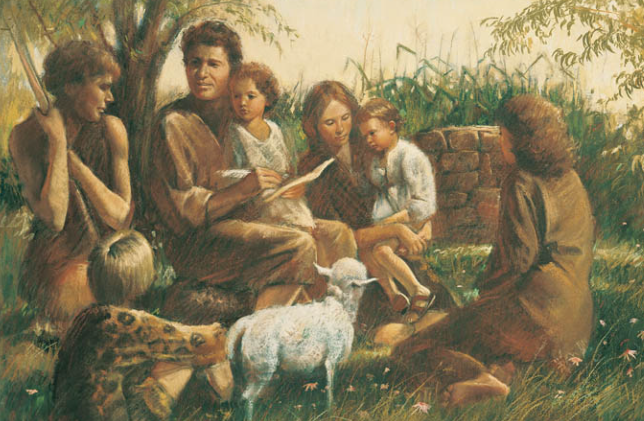
Genesis 5:30
And Lamech lived after he begat Noah five hundred ninety and five years, and begat sons and daughters:
Lamech fathered more sons and daughters after he fathered Noah. But none of the brothers and sisters of Noah believed the Word of the Lord, and thereby perished in the flood.
As with most of the other men listed in this chapter, verses 30 and 31 describe Lamech as having additional children, and then passing away. According to the numbers given in this passage, Lamech lived 595 more years after Noah was born.
Since we’re told in Genesis 7:6 that Noah was 600 years old when the floodwaters came on the earth, this means Lamech died just 5 years before the flood.
As with Methuselah, there is a sad aspect to reading about Lamech’s many children. One way or another, only Noah, his wife, and their family would be rescued from the flood. The rest of Lamech’s offspring will not survive.
One also has to wonder how Lamech felt about the state of mankind. According to Genesis 6:5, the human race was rapidly decaying into horrific evil. And yet, men like Lamech had lived on earth at the same time as men like Adam and Seth.
The contrast between these eras would have been especially clear to someone like him.
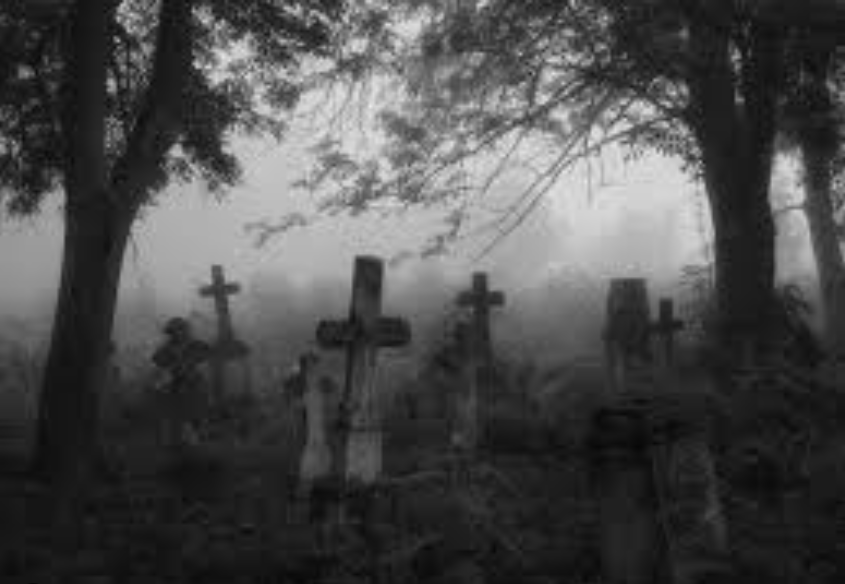
Genesis 5:31
And all the days of Lamech were seven hundred seventy and seven years: and he died.
Here we see Lamech died after seven hundred seventy seven years of life on earth.
At 777 years old, Lamech’s lifespan is more than one hundred years shorter than any of his fathers, dating back to Adam. The only exception is his grandfather, Enoch, who did not die.
Was this a gift of mercy to Noah?
We don’t know, since the details of this passage are few and far between. However, looking at the ages given in this passage, Lamech lived 595 years after fathering Noah. The floodwaters came on the earth when Noah was 600 years old (Genesis 7:11).
And so, Noah would have had the comfort of knowing that his father would not be killed in the flood that would take so many other lives.
The passing of Lamech and his father, Methuselah, also marks a sad occasion for the human race. With their deaths come the end, in a general sense, of those who walked the earth at the same time as Adam and Seth.
At least among the names of this chapter, Lamech is the last to be born prior to death of Seth. Noah, on the other hand, was born just after these men departed.
In a very literal sense, humanity after the flood would have to live, for the first time, without any direct memories of our earliest ancestors.
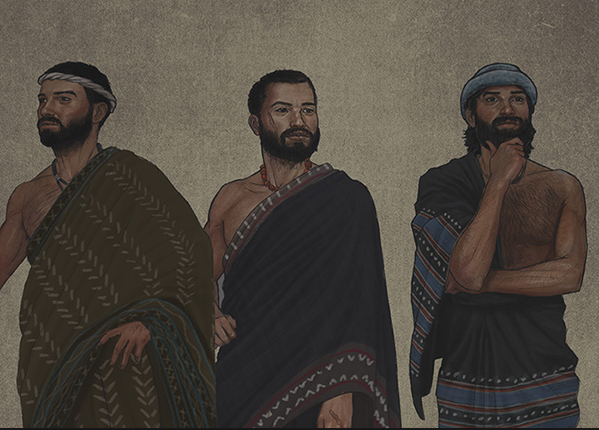
Genesis 5:32
And Noah was five hundred years old: and Noah begat Shem, Ham, and Japheth.
Due to the fact that every human being on the face of the Earth died in the flood, with the exception of Noah and his family, this means that every person who has ever lived since then is a descendant of either Shem, Ham, or Japheth, who are all sons of Noah.
It is the popular theory in the world, blindly accepted by men, and the conclusion, I think, of all philosophy, that human nature is inherently and innately good and that it can be improved.
The whole program that is abroad today is that, if we will just try to improve the environment of man and his heredity, he can really be improved. Communism and socialism seek to improve man. Arminianism means that man can assist in his salvation. Modernism says that man can save himself.
In other words, salvation is sort of a do-it-yourself kit that God gives to you. Some of the cults tell us that human nature is totally good and that there is no such thing as sin.
What does God say concerning man?
God says that man is totally evil, totally bad. That is the condition of all of us. “There is none righteous, no, not one” (Rom. 3:10). That is the estimate of the Word of God.
If we will accept God’s Word for it, it will give us a truer conception of life today than is given to us by others. Here is mankind, and we are following a godly line now.
Where is it going to lead?
Is it going to lead to a millennium here upon this earth?
No. The very next chapter tells us that a Flood, a judgment from God, came upon the earth.
This chapter of genealogy ends with the birth of three more sons. The quick, detail-free nature of this chapter is on full display here, as we are only given the rough age when Noah fathered these particular sons.
We are not told specifically how old Noah was when each of his sons were born, only that they were all born after he was 500 years old. This is not meant to imply that they were triplets, or that Noah’s wife had all three within a twelve-month span.
For the purposes of the story, all that matters is knowing that, around that age, Noah had the three offspring who would accompany him on the ark.
Interestingly, Noah is the first patriarch who is not explicitly described as having other sons and daughters. Technically, the Bible does not say that Noah did not have other children.
And yet, all the other men listed were said to have had multiple other offspring. This might have been an act of mercy by God, along with the death of Noah’s father, Lamech, prior to the flood.
It would have been merciful, indeed, to spare Noah the pain of seeing any of his children killed in God’s judgment.
Noah’s birth will serve as introduction to the next chapter. There, God will respond to the pervasive, depraved evil of mankind (Genesis 6:5; Genesis 6:11).
I hope that you have really enjoyed this post,
Please Leave All Comments in the Comment Box Below ↓













Interesting topic.
Noah had a task that none of us envy; he built an ark to shelter a future world of creatures and his family from the flood. In short, God reset the earth he created because of the prevalent wickedness of man.
No doubt, Methusaleh must have imparted quite a bit of wisdom to Noah about the creation. The flood was a reckoning. If the years of patriarchs in your chart are correct, The Almighty had quite a bit of patience before deciding to send it to cleanse the earth.
Even with modern times, we see His patience and a promise kept as a total love for mankind. Despite all the current standards of wickedness of modern man, His Love endures.
Hello Elridge,
Thank you for commenting on this episode, as well as considering it interesting.
GOD sure is Patient. GOD is Love, and:
Love is patient. Love actively waits for others without resentment. This would include being patient in the face of being hurt or mistreated.
Love is kind. Beyond mere politeness, kindness involves acting for the good of others even when it does not benefit ourselves.
Love does not envy. Envy was alive and active in the Corinthian church, perhaps including the envy of the spiritual gifts and financial success of others. Love sets self aside and celebrates the successes of Christian brothers and sisters.
Love does not boast. Boasting is the work of self-promotion in obvious and subtle ways. Love quits that job and goes to work praising God and other believers, instead.
Love is not arrogant or “puffed up.” Arrogance involves confidence in oneself above all others and the expectation that everyone else should feel the same way. Love removes the obstacle of self from the purpose of serving others well.
Thank you again for your time,
Blessings My Friend!
Thank you for sharing your thoughts on the genealogy of Enoch to Noah. It’s indeed an interesting topic that raises questions about the timeline and gaps in the biblical narrative.
The story of Noah and the flood is a significant event in religious history, and the presence of Methuselah in the genealogy adds an intriguing element.
Methuselah’s long lifespan and the timing of his death just before the flood certainly invite speculation about his role and the potential knowledge he could have passed on to Noah.
Hello Anoth,
Welcome back to the HBS & DwJ website.
Thank you for commenting on yet, another Holy Bible Study session, turned HBS & DwJ Podcast episode.
You are welcome for the sharing of my thoughts onThe Genealogy Of Enoch To Noah – A Bridged Gap. I really appreciate you considering this information an interesting topic. I am also thankful that it peaks your interest at all.
Please come back and visit this website, the podcast, and the store anytime.
Thanks again,
Blessings My Friend!
I found this article really interesting.
I didn’t know that the great flood came so close to the creation as in people drowning in the flood who actually talked to or knew Adam.
It is also amazing that people lived for hundreds of years back then which just shows that we were designed to live long productive lives but over the years environmental and our genes are killing us off a lot earlier.
With all the evil things going on in our world today it is also surprising God is being so patient with his love and mercy, but I am sure this state of things won’t last forever.
Hello Michel,
I hope all is well with you.
Thank you for your observation about this summary of Holy Bible Study portion of Genesis. Adam and Methuselah, pretty well bridged the gap between Creation and the Flood.
According to our genealogy, given in this account, it is possible that Methuselah could have told Noah everything from the creation of the world because his life spanned 969 years. Making him the longest living human being in the entire world.
Thanks again for your interest,
Have A Blessed Day!
This is a fascinating passage from Genesis, and it raises a lot of interesting questions.
One question that I have is why Methuselah lived so long. The text doesn’t explicitly say, but there are a few possible explanations.
One possibility is that Methuselah’s long lifespan was a sign of God’s favor. After all, he was the grandfather of Noah, who was chosen by God to save the human race from the flood. It’s possible that God gave Methuselah a long life so that he could pass on his knowledge and wisdom to Noah.
I’d love to hear your thoughts on these questions.
Hello Jeffrey,
Thanks again for stopping by the HBS & DwJ Website.
Bible commentators have offered various explanations as to why the Book of Genesis describes him as having died at such an advanced age; some believe that Methuselah’s age is the result of a mistranslation, while others believe that his age is used to give the impression that part of Genesis takes place in a very distant past.
However, my thoughts about Methuselah’s long lifespan is irrelevant, since the focus on this topic is about The Genealogy Of Enoch To Noah – A Bridged Gap.
Thank you again for continuing to stop by and comment on the HBS & DwJ Website turned Podcast episodes.
Continued Blessings My Friend!
The question is asking about the potential implications of gaps in the genealogical records within the Bible, which are critical to establishing the biblical timeline of human history.
These genealogical records are often used to estimate the age of the Earth according to biblical interpretation. However, there are theories that suggest there may be gaps in these records, possibly due to omissions, lost texts, or translation issues.
If there are indeed significant gaps in these genealogical accounts, it would mean our current interpretation of the biblical timeline could be incorrect. It could mean that the Earth and humanity, according to the Bible, could be older than traditionally thought.
So the question seeks your thoughts on this matter:
Do you believe that the presence of these potential gaps could change our understanding of the biblical timeline?
If so, how might this affect the way we perceive human history as described in the Bible?
Furthermore, how might this impact the interpretation of other biblical events and narratives?
Hello John,
Thanks for stopping by the HBS & DwJ Website turned Podcast.
I focus more on my personal relationship with GOD, which is the focus we should All have, rather than spending too much time understanding the biblical timeline. There are many things and questions we may have that only GOD can answer, so I focus on the Big picture to keep from losing focus on what truly matters.
I try to revive my relationship with God by Talking to Him, do my best to Obey Him, study the Holy Bible Scriptures each day to revitalize my soul. This helps me to become a Doer, as well as, a Hearer of GOD’s Will.
Thank you again for your interest in HBS & DwJ. Please feel free to stop by anytime.
Blessings My Friend!